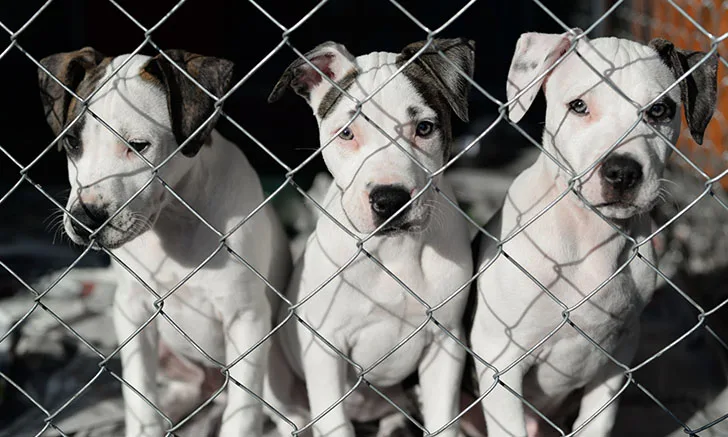Shelter Medicine Update: Managing Parvovirus in Animal Shelters

Sponsored by Elanco
Canine parvovirus is highly contagious and poses a significant threat to canine shelter populations. Parvovirus can spread rapidly and easily through feces and fomites, leading to dramatic outbreaks in animal shelters with large numbers of immunologically naïve dogs. Not only can these infections spread quickly, but the mortality rate for canine parvovirus can exceed 90% if left untreated.1 Effectively managing parvovirus in the shelter setting calls for a dual focus that involves providing high-quality individual patient care while also taking proactive steps to prevent viral spread. However, achieving these goals in the shelter setting poses an extreme challenge, as shelters often have limited resources and access to veterinary oversight, and without proper treatment and protocols, parvovirus cases in the shelter setting can lead to devastating outcomes on both an individual and population level.
Hugo’s Case
Hugo, a 3-month-old intact male pit bull crossbreed, was initially found as a stray. Hugo appeared healthy on his intake examination and was placed in the general shelter population. A fecal flotation revealed hookworms and roundworms; he was dewormed with pyrantel and received a DAPP vaccine and an intranasal Bordetella bronchiseptica/adenovirus 2/parainfluenza vaccine.
Two days later, the kennel staff noted watery diarrhea in Hugo’s kennel. They attributed this diarrhea to stress associated with vaccines, deworming, and a change in environment and opted to monitor Hugo closely for 24 hours. Hugo soon vomited and began to appear lethargic, prompting examination.
On physical examination, Hugo had a temperature of 102.9°F (39.4°C). His heart rate was 150 bpm, respiratory rate was 40 breaths per minute, and mucous membranes were pale pink, with a capillary refill time of 3 seconds. He was hypersalivating, and he was estimated to be 8% dehydrated. Thoracic auscultation was within normal limits. Hugo was uncomfortable on abdominal palpation, and fluid-filled intestinal loops were noted.
An in-house ELISA test for Giardia spp was negative, but in-house testing for parvovirus was positive. Based on these results, Hugo was diagnosed with canine parvovirus. The shelter veterinarian quickly began working on a plan to treat Hugo while simultaneously decreasing the risk for a large-scale shelter outbreak.
Hugo was immediately moved to isolation. He was handled by employees who were trained in isolation procedures and wore appropriate personal protective equipment, including double gloves, cap, gown, and booties. A footbath was placed in the doorway leading to the isolation area to reduce fomite transmission. Hugo’s kennel and nearby areas were thoroughly disinfected. Disinfection protocols were increased to shelter-wide, and all dogs were closely monitored for gastrointestinal signs. The shelter also tracked and limited movement of all animals in the facility to reduce the likelihood of further spread.
Hugo received supportive care. IV fluid therapy was provided to restore hydration and address ongoing losses, and maropitant was administered to control vomiting. Antibiotics were also prescribed to manage sepsis; Hugo’s veterinarian selected ampicillin, but other appropriate options could include cefovecin, enrofloxacin, or metronidazole.2 Hugo also received buprenorphine for abdominal pain due to its association with less ileus and vomiting as compared with other opioids.2
In addition to supportive care, the veterinarian prescribed Canine Parvovirus Monoclonal Antibody (CPMA) treatment. This conditionally licensed monoclonal antibody is the first targeted treatment for parvovirus and works by binding canine parvovirus to prevent it from entering cells. CPMA is administered as a 1-time IV injection at a dose of 0.2 mL/kg.
CPMA has a reasonable expectation of efficacy, and safety has been demonstrated in healthy dogs. A challenge study of 28 dogs assessed CPMA as the sole therapy for dogs experimentally infected with canine parvovirus.3 All CPMA-treated dogs survived infection as compared with just 43% of untreated dogs, and clinical signs (ie, vomiting, lethargy, inappetence) resolved significantly faster in CPMA-treated dogs.3 A field safety study of client-owned dogs also showed that adverse events were uncommon and mild in dogs as young as 6 weeks of age.4 Reported effects included mild diarrhea, pruritus, and local injection site reactions; no anaphylactic reactions were observed.4 Furthermore, dogs treated with CPMA had obvious reductions in the amount of canine parvovirus shed in their feces within 2 days of treatment, offering the potential for reduced spread.3
Hugo showed marked improvement within 3 days of treatment, and a parvovirus ELISA test was negative at that time. He was made available for adoption 2 weeks after his initial diagnosis and promptly adopted by an excited family. Fortunately, no additional parvovirus cases were noted in the shelter due to the team’s prompt action.
Conclusion
Easily administered as a single IV injection, Elanco’s CPMA is the first and only USDA conditionally approved monoclonal antibody that targets and binds canine parvovirus. Patients receiving CPMA have been shown to have faster resolution of clinical signs, decreased risk for death, and decreased viral shedding, thereby reducing environmental contamination of the shelter environment.3 CPMA carries a low risk for side effects, offering numerous advantages with few potential downsides.
It is important to note, however, that CPMA is not intended to replace supportive care. Affected dogs will still need IV fluid therapy for rehydration, antiemetics for rapid control of vomiting and nausea, antibiotics to address potential sepsis, and analgesics as needed for pain. However, by combining these standard treatments with CPMA, shelters can ensure these dogs are ready to be adopted by their new family as soon as possible, with a reduced burden to the shelter staff.
Want to learn more about Canine Parvovirus Monoclonal Antibody? Check out these additional resources.
Elanco and the diagonal bar logo are trademarks of Elanco or its affiliates. Other company names are trademarks of their respective owners. PM-US-23-1678
